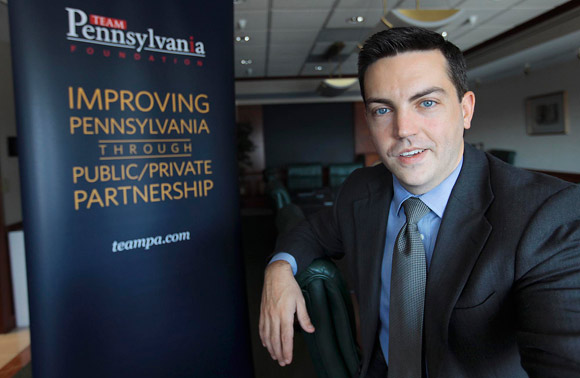A five-year study by Team Pennsylvania Foundation and the Commonwealth’s Department of Community and Economic Development (DCED) that was published in January, revealed that 0.03 percent of all PA businesses accounted for over 24,000 new jobs from 2004-09. According to Outlier LLC, which conducted the survey for Team PA, this represents 74 percent of all net new jobs in the state during the study period.
These companies are known as “higros,” the current buzz word for revenue and job growth across the country, and Pennsylvania is at the forefront of awareness and potential development. Just don’t ask for examples (yet).
“Everyone asks, and my reply is that this is not a call list. What’s important is that we create an entrepreneurial ecosystem for fostering success and rising to next level,” says Matt Zieger, president and CEO of Team PA. “Rather than focusing on specific industries or regions, we’re asking ‘who’s creating; how can we help?’”
In serendipitous coincidence, during the same month the Team PA study was released, President Barack Obama announced the establishment of Startup America Alliance, a public-private partnership charged with helping higros develop by working with the government while garnering support within the private sector. Operating under the aegis of the Small Business Administration, the alliance established its board of business luminaries, chaired by AOL co-founder Steve Chase, in August.
“What we really have to do as a nation,” Chase stated in a CNBC appearance, “is celebrate these entrepreneurs and give them resources that can enable them to take their companies to the next step, and also make sure that the public-policy framework is in place that enables them to have the best shot at success.”
Remaining small by choice
“From 1980 to 2005, firms less than five years old were responsible for all net job creation in the U.S.,” according to Carl J. Schramm, president and CEO of the Kauffman Foundation, a founding partner of Startup America. “However, new Kauffman research indicates that in recent years, young companies are starting smaller and staying smaller.”
The best way to understand what defines a company as a higro is in knowing what it is not:
• It is not a localized small business such as restaurants, service suppliers, small grocers, and the like that serve only the locale in which they’re situated.
• It is not necessarily high tech.
• It does not necessarily target becoming a large business, so is usually not a startup hoping either to go public or be purchased by a larger company.
• It does not particularly seek out venture capital (fewer than 25 percent do so), and many are founded as and remain partnerships or LLCs.
Notwithstanding all this, at one time, FedEx, which was started with a Small Business Administration loan, would have been considered a higro in its early stages, based on its growth rate, revenues, and subsequent growth in the number of new jobs created.
In four short years, Living Social, a deal-of-the-day cyber-company that started with four employees in 2007 now employs some 3,000. Launched in Washington, DC, it has recently moved its base to Chicago, because of the favorable conditions Illinois offers to such companies – a lesson for other states to consider.
Although there are the expected complaints around the country that Startup America is not getting things done quickly enough, it is to be hoped that Pennsylvania has an edge for having already done such extensive research. In fact, one of the first calls from Startup America was to Ben Franklin Technology Partners, who in turn immediately phoned Team PA – with which they had been working on the higro project.
Growing where they’re planted
The Team PA study concluded that higros are found in almost all industry sectors – 69 out of the 72 studied– and in nearly every county of the state. Some of the companies had as few as five employees, with the composite average being 26. These companies are likely to continue growing even during recessions, so communities of all sizes benefit from being home to such firms.
“This flies in the face of traditional cluster theory,” states Zieger. “The study shows that smart businesses and smart leaders will grow anywhere they’re started, and there’s no predicting where they might develop.”
What Team PA is recommending to DCED similarly flies in the face of what government commonly is called upon to do. Along with assisting companies in distress, programs are being developed to prepare successful companies for growth.
The singular condition that Team PA enjoys is that it is the only such organization in any state that has the Governor as its active co-chair. It doesn’t have to shout to make itself heard, and it’s already clear that many ears are listening.
As a first step, a “living laboratory” is being created in the southwestern part of the state. Working with the Pittsburgh Regional Alliance, Ryan C. Unger, Team PA Director of Policy and Programs, details that this consists of the top 25 percent of higro companies in an eight-county area surrounding Pittsburgh; 150 companies selected on the basis of total employment and total job growth.
These companies represent various industries:
• Summa, a Pittsburgh IT consultancy has won awards and acquired another company in the last 14 months and has doubled its workforce to 85 employees.
• Elizabeth Gregg founded Environmental Service Laboratories, Inc., a provider of Marcellus Shale water-testing and toy-testing services, with two employees in Indiana in 1988 and now runs two companies with 80 employees and has divisions in Williamsport and Van Voorhis (they're currently hiring technicians).
• Wayne Freed started a division of Ohio-based Hannon Electric in his Beaver County basement and now employs more than 10 after extensive investments in industry-leading testing equipment.
• Knepper Press in Clinton is the Pittsburgh area's oldest (since 1873) and largest printer, achieving 10 percent annual revenue growth since 1983 and 25 percent in the last two years.
Drawing on the Outlier LLC study, Team PA is formulating concepts for DCED to consider implementing throughout Pennsylvania.
“Success is happening in different quadrants than we have been working in,” Zieger states. “Traditional systems of economic development have not done a great job of helping these companies. The study has shed a different light on how the economy grows.”
He notes, for example, that companies already know how to get to market. “Access to markets is equitable across the state. It’s more about ideas and management of ideas.”
On the macro level, Zieger would like to see a re-orientation directed at helping smaller companies and greater regions. There would, for example, be great value in making it possible for small business to enjoy R&D tax credits.
On a micro level, he foresees such actions as providing training programs for the personnel of small companies. For example, as employee numbers grow, train a team leader to be a foreman, or an executive assistant to be an HR specialist; help owners/managers understand markets.
Eschewing the notorious practice of poaching companies from other states, Zieger believes efforts should be focused on retention, innovation, talent attraction, capital development, and international exports. Three recently received Federal grants will contribute to these efforts.
“We’d also like to look at the next five to seven percent of companies that are right on the edge of growth and lift them.” He notes that there has been “great reaction from business” and recognition that growth is a challenge.
And it certainly helps to have the Governor’s ear for what he predicts: “big policy shifts — anticipate big changes in coming years,” Zieger concludes.
RUTH HEIGES is a freelance writer from Elkins Park. Send feedback here.
PHOTOS:
Matt Zieger, President & CEO of Team PA Foundation
Zieger and the Team PA Directors meet to discuss strategy
Team PA Chief Financial Officer John Packer Chief Financial Officer, left, and Manager of International Initiatives Lindsay Michael, plan a meeting for International business outreach.
Zieger at work
Team PA Foundation
All photographs by MIKE BUPP





